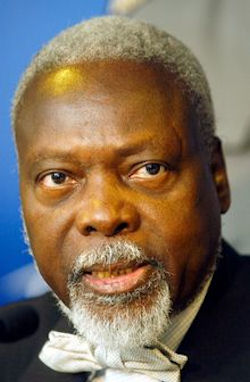1993 - Ange Felix Patasse
 Ange Felix Patasse won a second-round victory in rescheduled elections held in October 1993, and was re-elected for another 6-year term in September 1999. Inheriting a military consisting of soldiers from Kolingba’s ethnic group, the Yakoma, Patassé created militias favoring his own Gbaya tribe and did not bother to pay the Yakoma-dominated regular army. Salary arrears, labor unrest, and unequal treatment of military officers from different ethnic groups led to three mutinies against the Patasse government in 1996 and 1997. The French succeeded in quelling the disturbances, and an African peacekeeping force (MISAB) occupied Bangui until 1998 when they were relieved by a UN peacekeeping mission (MINURCA).
Ange Felix Patasse won a second-round victory in rescheduled elections held in October 1993, and was re-elected for another 6-year term in September 1999. Inheriting a military consisting of soldiers from Kolingba’s ethnic group, the Yakoma, Patassé created militias favoring his own Gbaya tribe and did not bother to pay the Yakoma-dominated regular army. Salary arrears, labor unrest, and unequal treatment of military officers from different ethnic groups led to three mutinies against the Patasse government in 1996 and 1997. The French succeeded in quelling the disturbances, and an African peacekeeping force (MISAB) occupied Bangui until 1998 when they were relieved by a UN peacekeeping mission (MINURCA).
Qadhafi's Libya was among the first Arab countries to open a diplomatic mission in the Central African Republic. Colonel Qadhafi visited CAR several time and even succeeded in converting President Bokassa to Islam for a very short time in 1976. Though Libyan involvement continued post Bokassa, it was President Ange Felix Patasse, elected in 1993, who developed the strongest political, financial, economic and military relationships with Tripoli.
Economic difficulties caused by the looting and destruction during the 1996 and 1997 mutinies, energy crises, and government mismanagement continued to trouble Patasse's government through 2000. Libya backed Patasse in the resolution of the political and military crises that the country faced during the 1996 and 1997 mutinies as well as the May 2001 Andre Kolingba-led coup attempt.
In March 2000 the last of the MINURCA forces departed Bangui. In May 2001 rebel forces within the C.A.R. military, led by former President and Army General Andre Kolingba, attempted a military coup. After several days of heavy fighting, forces loyal to the government, aided by a small number of troops from Libya and the Congolese rebel Movement for the Liberation of the Congo (MLC), were able to put down the coup attempt. In November 2001, there were several days of sporadic gunfire between members of the Presidential Security Unit and soldiers defending sacked Chief of Staff of the Armed Forces Francois Bozize, who fled to Chad. In mid-2002 there were skirmishes on the C.A.R.-Chad border. To protect Patasse's regime, Libya deployed troops and significant military equipment which were then used later to oppose Francois Bozize's rebellion of October 2002.
Patasse was a three time presidential candidate and two time winner who still harbored ambitions of returning to power. His dependence upon foreign military assistance from Qadhafi and Bemba, as well as the violent excesses and corruption of his rule, severely dampened his credibility, if not his ardor, to become head of state for a third time. Persona non grata until the December 2008 peace talks, Patasse arrived in Bangui with much fanfare before returning to his Togolese residence in exile where he lived since 2003. His reentry did not translate into a new burst of popularity.
Patasse remained charismatic and still had some support in Ouham-Pende as well as the MLPC. His populist rhetoric resonates among some and his rhetorical talents were well known. Though the amounts were unknown, Patasse was thought to have amassed a fortune during his time as President and must still have had formidable amounts in reserve. Without question, this made him a credible challenger despite his apparent lack of popularity. Most did not recollect the era of Patasse with any fondness. Bemba's raping and looting of Bangui convinced those who were not already turned off by his outright corruption and graft. He was still at risk of being cited to appear before the International Criminal Court.
Patasse, who led the desperately poor nation of Central African Republic for a decade before being ousted in a 2003 coup, died at a hospital in neighboring Cameroon, officials said 05 April 2011. Hospital officials said he died of complications from diabetes.
|
NEWSLETTER
|
| Join the GlobalSecurity.org mailing list |
|
|
|

